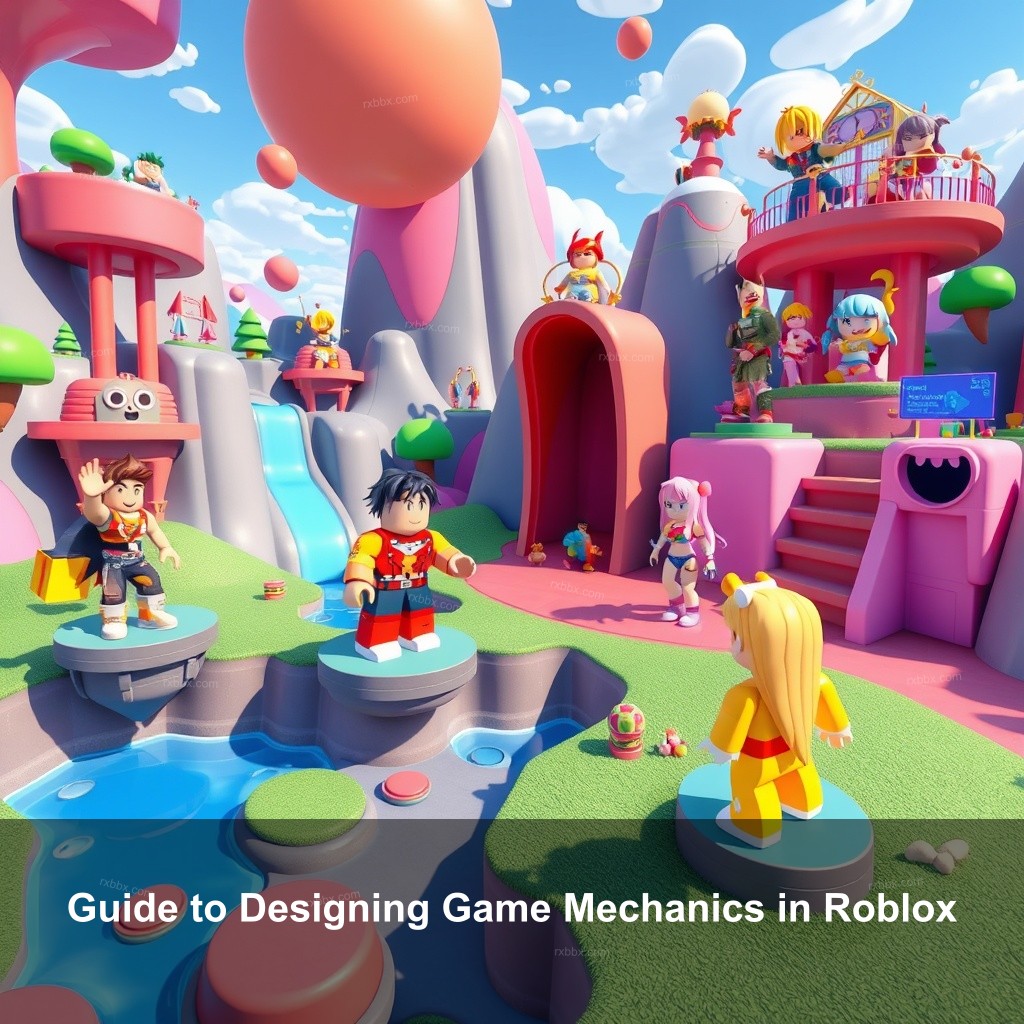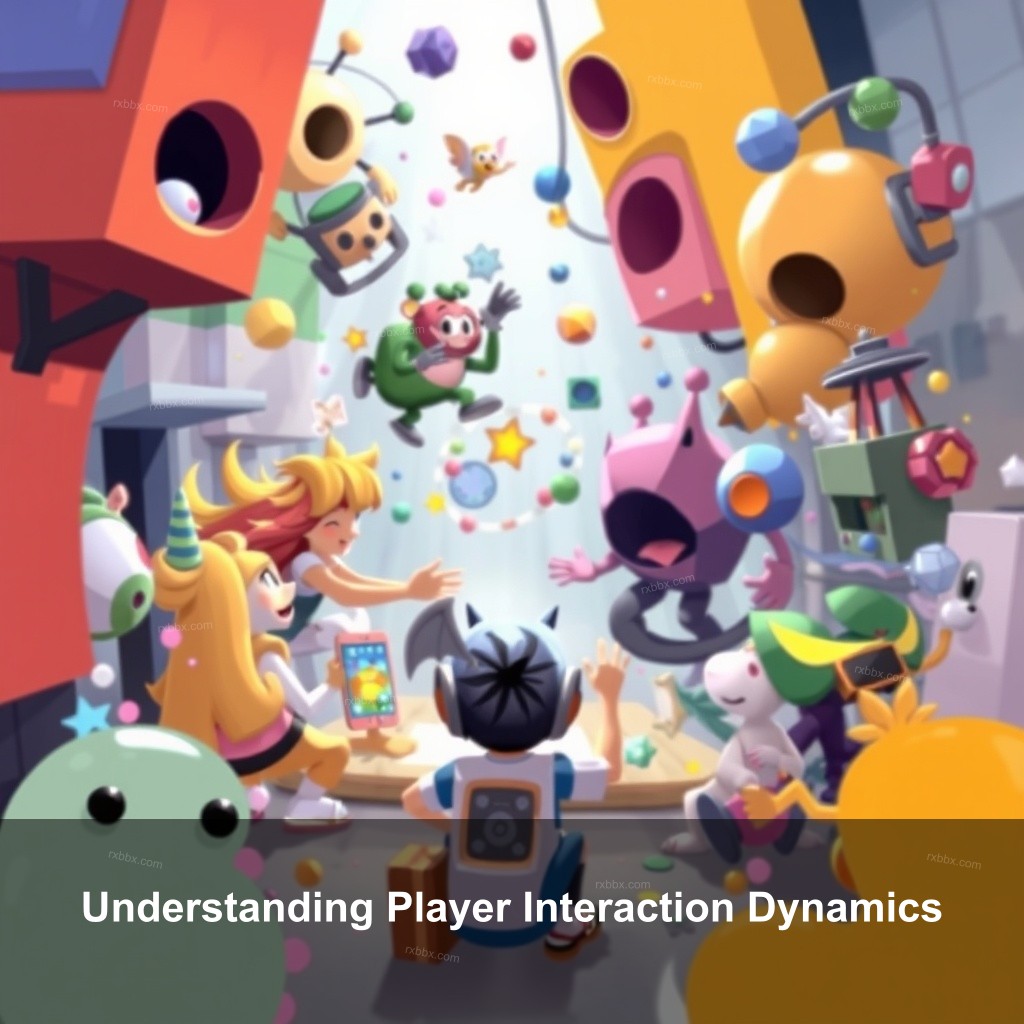Did you know that the right game mechanics can make or break a player’s experience in Roblox? At RxBBX Gaming Hub, we’re here to guide you through designing engaging game mechanics that captivate players and keep them coming back for more. This guide will cover everything from defining game mechanics to best practices for creating interactive gameplay. Get ready to improve your gaming creations!

Guide to Designing Game Mechanics in Roblox
Game mechanics serve as the foundation for any game, dictating how players interact with the environment and each other. Understanding Roblox game mechanics is important for developers looking to create engaging experiences. This section will break down the core components that make up effective gameplay mechanics.
Understanding Roblox Game Mechanics
When looking at game mechanics, it’s essential to clarify what they are. Game mechanics refer to the rules and systems that guide player interactions within the game world. They dictate how players move, what actions they can perform, and how they interact with non-player characters (NPCs) and the environment.
Effective game mechanics are important for player retention and satisfaction. For example, a popular game like Adopt Me! utilizes engaging mechanics that allow players to adopt pets and interact with others, creating a fulfilling experience. In contrast, poorly designed mechanics can lead to frustration and disengagement.
Roblox games use common mechanics such resource collection, fighting systems, and crafting. Every one of these adds to the whole gameplay experience by enabling players to really sink into the game atmosphere. Understanding the significance of these mechanisms can help creators produce more interesting games that entice players back-off.
| Mechanic Type | Examples | Impact on Gameplay |
|---|---|---|
| Movement | Walking, Jumping, Climbing | Influences navigation and exploration |
| Combat | Attacking, Defending | Determines player strategy and interaction |
| Crafting | Creating items, Upgrading gear | Enhances player engagement and creativity |
How to Design Game Mechanics in Roblox
Having established game mechanics, let us now discuss efficient design of them. Identification of player needs comes first. Knowing the preferences of players for gameplay will guide the mechanisms you apply. To get understanding, think about surveys or gaming statistics.
Prototyping your mechanisms is crucial once you have identified what players want. One can create small-scale prototypes testing particular mechanics. Easy prototypes made possible by Roblox Studio let you iterate fast and get comments.
Once you have a prototype, seeking feedback is crucial. Engaging with players and incorporating their insights will help refine your mechanics and align them with player expectations. Remember, successful game design means being flexible and willing to change!
Best Practices for Gameplay Mechanics in Roblox
Creating engaging gameplay mechanics combines both creativity and strategy. This section will cover best practices to ensure your mechanics are functional and enjoyable.
Creating Engaging and Interactive Game Rules
Clear and simple rules are the foundation of great gameplay. Players should easily understand how to interact with the game without feeling overwhelmed. For instance, a game like Jailbreak has straightforward mechanics that players grasp quickly, making it accessible to a broader audience.
- **Simplicity**: Keep rules straightforward for better comprehension.
- **Challenge and Accessibility**: Balance difficulty to maintain interest and enjoyment.
- **Encourage Creativity**: Allow players to influence mechanics for a deeper connection.
Another crucial issue is juggling accessibility with challenge. Mechanics should push players without making them very challenging. A game striking this balance motivates players to challenge their limits while still having fun. Add components that let gamers feel successful as they advance.
Furthermore, it’s wise to encourage player creativity. Games that let players influence mechanics or outcomes tend to foster a deeper connection. Consider how games like MeepCity enable players to design their houses, making the game feel personal and engaging.
Utilizing AI and Procedural Generation
Incorporating AI into your gameplay mechanics can significantly improve the experience. AI can adjust game dynamics based on player behavior, creating a more personalized experience. For example, NPCs powered by AI can react dynamically to player actions, creating a more immersive environment.
- **AI-Driven NPCs**: Enhance interaction by making characters more responsive.
- **Procedural Generation**: Create unique game environments that keep players engaged.
- **Hybrid Mechanics**: Combine traditional mechanics with AI for a richer gameplay experience.
An other fascinating tool for developers is procedural generation. It makes possible distinctive game contexts that improve repeatability. Procedural generating games can provide different obstacles every time a player interacts with them, therefore preserving the experience.
Combining traditional mechanics with AI and procedural generation can yield incredible results. Consider creating hybrid mechanics that leverage player data and AI-driven NPC interactions to craft unique gaming experiences.
Analyzing Game Behavior and Player Engagement
Understanding how players behave in your game is key for refining mechanics and enhancing engagement. This section highlights the relationship between game behavior and player interaction.

Understanding Player Interaction Dynamics
Player interactions can greatly influence their enjoyment of the game. There are various types of interactions to consider, such as cooperative gameplay and competitive dynamics. For example, games like Piggy allow players to work together to solve puzzles, promoting collaboration.
- **Types of Interactions**: Identify cooperative vs. competitive dynamics.
- **Social Features**: Incorporate chat and trading for enhanced engagement.
- **Engagement Metrics**: Track player behavior to assess interaction effectiveness.
Social dynamics within games also play a significant role in player engagement. Features like chat systems, trading, and team-based gameplay can foster connections, enriching the overall experience. Games that emphasize social interaction often retain players longer.
Measuring player engagement is key to assessing how well your mechanics perform. Utilize analytics tools to track player behavior and identify trends. This data can reveal how players engage with your mechanics and show areas for improvement.
Adapting Mechanics Based on Player Feedback
Gathering player feedback is essential for evolving your game mechanics. Implementing effective feedback systems allows players to voice their opinions and experiences. Consider using in-game surveys or forums to collect insights from your audience.
- **Collecting Feedback**: Use surveys and forums for player insight.
- **Analyzing Trends**: Look for common themes in player comments.
- **Implementing Changes**: Communicate updates to build trust with players.
Trend analysis is absolutely essential once input is gathered. Search for trends in player comments pointing up shared issues or recommendations. Understanding these patterns will help you to make deliberate mechanical enhancements.
When implementing changes, it’s crucial to communicate updates to your players. Keeping them informed creates a sense of community and shows that you value their input. A transparent approach will help build trust and encourage ongoing feedback.
Conclusion: The Future of Game Mechanics in Roblox
Particularly on platforms like Roblox, game mechanics’ direction is always shifting. Developers hoping to produce hit games must keep ahead of trends. Investigate newly developing trends like virtual and augmented reality, which are altering game interaction.
Continuous learning is vital for developers. Staying informed about advancements in game design tools can significantly impact the quality of your mechanics. Resources like Roblox Studio scripting tutorial provide valuable insights for developers at any stage of their journey.
Lastly, building a community around game mechanics can foster growth and inspiration. Engaging with other developers and players can spark new ideas and improvements. At RxBBX Gaming Hub, we encourage you to share, comment, and explore more content to stay connected with the gaming community.
FAQ
What are the key components of Roblox game mechanics?
The key components of Roblox game mechanics include rules governing player actions, interaction dynamics, and feedback systems that shape player experiences.
How can I create engaging game rules in Roblox?
To create engaging game rules in Roblox, ensure they are clear, simple, and encourage creativity through player interaction.
What role does AI play in Roblox game mechanics?
AI enhances gameplay by providing dynamic interactions with NPCs and personalizing the player experience based on behavior.
How can player feedback improve my game mechanics?
Player feedback identifies areas for improvement, helping developers refine mechanics for a better gaming experience.
What are some effective ways to measure player engagement?
Utilizing analytics tools to track player behavior, feedback systems, and monitoring player retention rates are effective for measuring engagement.
